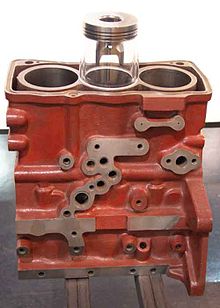Straight-three engine
This article needs additional citations for verification. (July 2009) |

A straight-three engine, also known as inline-three engine, or a triple, (abbreviated I3 or R3) is a reciprocating piston internal combustion engine with three cylinders arranged in a straight line or plane, side by side.
Most inline-three engines employ a crank angle of 120°, and are thus rotationally balanced; however, since the three cylinders are offset from each other, the firing of the end cylinders induces a rocking motion from end to end, since there is no opposing cylinder moving in the opposite direction as in a rotationally balanced straight-six engine. The use of a balance shaft in an antiphase to that vibration produces a smoothly running engine.[1]
An exception to the 120° crankshaft can be found in some of the inline-three engines made by motorcycle manufacturer Laverda. In these engines (sometimes referred to as 180° triples), the outer pistons rise and fall together like a 360° straight-two engine. The inner cylinder is offset 180° from the outer cylinders. In these engines, cylinder #1 fires 180°. Later, cylinder #2 fires, and then 180° later cylinder #3 fires. There is no power stroke on the final 180° of rotation.
Automobile use


The smallest inline-three, four-stroke automobile engine was the 543 cubic centimetres (33.1 cu in) Suzuki F5A, which was first used in the 1979 Suzuki Alto/Fronte. Smart currently produces a diminutive 799 cubic centimetres (48.8 cu in) inline-three diesel engine, the smallest automotive diesel engine yet.[citation needed] Most inline-three engines fall below 1.2 litres, with a 1,198 cubic centimetres (73.1 cu in) Volkswagen Group unit seen as the largest petrol engine. A 1,779 cubic centimetres (108.6 cu in) diesel engine was produced by VM Motori to the 1984 Alfa Romeo 33 1.8 TD, the largest inline-three produced for automotive use.
Basic versions of the Suzuki Swift/Forsa and related Geo/Chevy Metro used an inline-three.
Some Daihatsu cars use inline-three engines. The Charade and the Mira/Cuore used (or are still fitted with) this engine type. Three-cylinder 1.0 litre diesel and turbo diesel engines were also offered in Daihatsu Charades. Korean cars Daewoo Tico, based on the 1988 Suzuki Alto, and later base versions of Daewoo Matiz also used inline-three 796 cubic centimetres (48.6 cu in) 41 horsepower (31 kW; 42 PS) S-TEC petrol engine.
The Volkswagen Group is known for using three cylinder petrol- and diesel engines; in the Audi A2, Volkswagen Polo, Volkswagen Fox, SEAT Ibiza and Škoda Fabia. The engines in these cars range from 1.2 litre petrol[2] with four valves per cylinder that deliver 47 to 65 kilowatts (64 to 88 PS; 63 to 87 bhp), to 1.4 TDI diesels=[3] that deliver 51 to 66 kilowatts (69 to 90 PS; 68 to 89 bhp) and have turbos with variable vane geometry and deliver outstanding economy, this particular engine is used in small cars of all marques of the Volkswagen Group. The most innovative three cylinder engine the Volkswagen Group released was the 1.2 TDI diesel,[4] it was one of the first all-aluminium diesel engines, and at the time of release it was the lightest and most economic engine in production. It was used in the "3L" versions (from its diminutive fuel consumption of only 3 litres per 100 kilometres (94.2 mpg‑imp; 78.4 mpg‑US)*) of the Audi A2 and the Volkswagen Lupo.
Subaru also used an inline-three in the Subaru Justy and the export version of the Subaru Sambar, called the Subaru Sumo, using their Subaru EF engine.
Mitsubishi has also made extensive use of three cylinder engines.
In the 1950s and 1960s, the Saab 93, Saab 95, Saab 96, and certain Dampf-Kraft-Wagen (DKW) automobiles were powered by inline-three-cylinder, two-stroke engines. Also, the Wartburg automobiles manufactured in Eastern Germany, and FSO Syrena manufactured in Poland, used this kind of engine.
The first-generation Honda Insight (2000–2006) used a 1.0 litre inline-three engine in conjunction with an electric motor in its hybrid system.
Toyota, Peugeot and Citroën are using a common inline-three-cylinder engine in models of Aygo, 107 and C1 respectively.
Motorcycle use

Four-stroke
A four-stroke inline-three has been used by Aprilia, Laverda, Triumph, Yamaha, BMW, Benelli, Petronas, MV Agusta and BSA.
The Triumph Rocket III has a 2,294 cc (140.0 cu in) inline-three engine.
Two-stroke
Between 1972 and 1977, Suzuki made three inline-three two stroke types: the water-cooled GT750 and the air-cooled GT550 and GT380.
Between 1969 and 1978, Kawasaki triple motorcycles had inline-three air-cooled engines with capacities of 250 cc, 350 cc, 400 cc, 500 cc, and 750 cc.
Non-automotive use

Inline three cylinder engines are not limited to propelling motor vehicles. The may also be used in general industrial applications. An example is the Fairbanks-Morse 32E14 slow-speed diesel engine which is shown coupled to a water pump.
Aviation use
The Hewland AE75 is a 750 cc lightweight two-stroke inverted three-cylinder liquid-cooled aircraft engine that produced 75 bhp (56 kW), manufactured in the mid-1980s by Hewland.[5]
References
- ^ "Inline 3-cylinder engines". Mark Wan - AutoZine Technical School. AutoZine.org. Retrieved 3 January 2010.
- ^ "New VW Fox in depth". Volkswagen AG. WorldCarFans.com. 2005-04-04. Retrieved 2009-08-18.
- ^ "New Audi A2 1.4 TDI with 90 bhp engine". AUDI AG. WorldCarFans.com. 2003-11-10. Retrieved 2009-08-22.
- ^ "Audi A2 1.2 TDI: the three-litre car from Audi". AUDI AG - press release. AudiWorld.com. 1999-11-28. Retrieved 2009-08-22.
- ^ “Pilot” magazine February 1986 page 32
